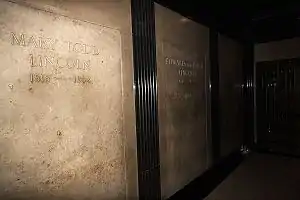crypt
English

Mary Todd Lincoln's crypt
Etymology
From Latin crypta (“vault”), from Ancient Greek κρυπτός (kruptós, “hidden”). Doublet of grotto.
Pronunciation
- IPA(key): /kɹɪpt/
Audio (Southern England) (file) - Rhymes: -ɪpt
Noun
crypt (plural crypts)
- (now rare) A cave or cavern. [from 15th c.]
- An underground vault, especially one beneath a church that is used as a burial place. [from 16th c.]
- 1922, Michael Arlen, “3/2/1”, in “Piracy”: A Romantic Chronicle of These Days:
- She turned and waved a hand to him, she cried a word, but he didn't hear it, it was a lost word. A sable wraith she was in the parkland, fading away into the dolorous crypt of winter.
- 2012, Andrew Martin, Underground Overground: A passenger's history of the Tube, Profile Books, →ISBN, page 106:
- On its arrival at Bank, incidentally, the City & South London's directors had threatened to demolish the church of St Mary Woolnoth, but after a public outcry the company built its station in the crypt of the church, the bodies being transferred [...]. Therefore St Mary Woolnoth doesn't have a crypt. Or you could say that its crypt is Bank station.
- (anatomy) A small pit or cavity in the surface of an organ or other structure. [from 19th c.]
- 2015, Giulia Enders, translated by David Shaw, Gut, Scribe, published 2016, page 25:
- Sometimes, too much foreign material can get caught in the crypts, leading to frequent infections.
- (botany) Any of the genus Cryptocoryne of aquatic plants of southern and southeastern Asia.
- (botany) Any of the genus Cryptopus of orchids of Madagascar and Mauritius.
Derived terms
Translations
underground vault
|
See also
References
 crypt on Wikipedia.Wikipedia
crypt on Wikipedia.Wikipedia  Crypt (disambiguation) on Wikipedia.Wikipedia
Crypt (disambiguation) on Wikipedia.Wikipedia
This article is issued from Wiktionary. The text is licensed under Creative Commons - Attribution - Sharealike. Additional terms may apply for the media files.